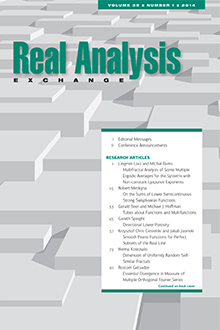Abstract
To every Lebesgue measurable subset of \(\mathbb{R}\) is associated a certain subcollection of points where the given measurable set possesses a density. By virtue of Lebesgue’s famous theorem on metric density, this associated set is a set of full measure in \(\mathbb{R}\) and is hence measure-theoretically very large. But are these sets also topologically large? In Lebesgue’s theorem, the set is kept fixed while the point is allowed to vary. If instead, we keep the point fixed a vary the set, then we may have corresponding to each point in \(\mathbb{R}\) a certain subclass of measurable sets each member of which possesses a density at that point. How large is this subclass in the “topology of measurable subsets of \(\mathbb{R}\)”? In this paper, in an endeavour to seek out answers to the questions set above, we have arrived at certain interesting and significant conclusions. Somewhat similar conclusions have been derived over analogous questions relating to ‘set-porosity’.
Citation
Sanjib Basu. "Uniform Continuity of a Product of Real Functions." Real Anal. Exchange 37 (2) 425 - 438, 2011/2012.
Information





